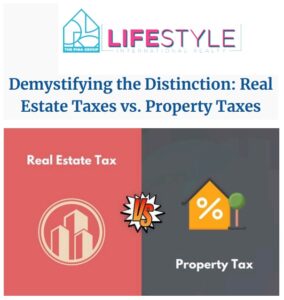
Real Estate Taxes vs. Property Taxes: An Overview
If you’re a homeowner, you probably know about real estate taxes, sometimes referred to as property taxes. However, it’s essential to recognize that these terms, though often used interchangeably, don’t refer to the same thing. Real estate taxes are levied by the municipality on the assessed value of your home. In contrast, personal property taxes apply to movable items like cars, boats, equipment, and furniture that you own.
KEY TAKEAWAYS
- While the terms real estate taxes and property taxes are at times interchangeable, they carry distinct meanings.
- Real estate taxes refer to the funds that your local municipality charges based on the assessed value of your residence.
- Personal property taxes are levied on movable possessions, including cars, campers, boats, and business assets like machinery, equipment, or furniture.
Real Estate Taxes
Real estate taxes are yearly payments that homeowners are obligated to pay based on the assessed value of their property. The real estate tax rate is determined by each city and state municipality, calculated by multiplying the fair market value of a home by a predetermined percentage specific to that locality, resulting in the tax assessment value.
Have you ever encountered individuals expressing discontent about the elevated real estate taxes in their vicinity? This is precisely what they are addressing, and increased tax rates are commonly observed in major cities such as New York or Los Angeles.
The real estate taxes you incur hinge on the valuation of your home and the geographical location. To illustrate, a rural town in Oklahoma is likely to have a considerably lower real estate tax rate compared to a bustling metropolis on the coasts or in major urban centers such as Dallas or Chicago.

How Real Estate Taxes Are Determined
Consider your home with a fair market value of $350,000 and a predetermined percentage in your municipality at 65%. This results in a tax assessment value of $227,500 (calculated as $350,000 x 65%). Assuming a local tax rate of 3%, your annual real estate tax would amount to $6,825. However, in a different locale with a higher tax rate, like 8%, a similarly valued home would incur $18,200 in annual real estate taxes. Clearly, location plays a pivotal role.
Property Taxes
Personal property tax, often referred to as property tax, applies to items that are not permanently affixed and can be moved. For instance, your car incurs a property tax when you register it annually. Boats, planes, campers, RVs, ATVs, farm equipment, and business assets like furniture or machinery, being movable, are all subject to personal property tax based on their assessed value—similar to the assessment of your home’s tax value.
Interestingly, mobile homes are classified under personal property rather than real estate for tax purposes. Despite being places of residence, their moveable nature places them in this category. However, if you own the land where your mobile home is situated, it would be subject to real estate taxes based on its assessed land value.
The amount you pay for personal property tax on these items varies according to your city and municipality, the prevailing personal property tax rate, and the assessed value of each personal item.

Key Differences
In terms of tax rates, it’s crucial to note the substantial difference between real estate taxes and personal property taxes. Real estate taxes are generally much higher compared to personal property taxes. For instance, vehicle property taxes typically amount to a few hundred dollars, depending on the state.
Homes are assessed at significantly higher values with correspondingly higher tax rates. Even in regions with the most affordable real estate taxes for a moderately valued home, the annual amount is likely to be in the thousands of dollars.
Additionally, there are potential tax benefits for homeowners. You may qualify to deduct real estate taxes on your home as expenses on your federal tax return, especially if you reside in the property and itemize deductions on Schedule A. While personal property taxes on items like boats or RVs may also be deductible when itemizing, the deductions are typically less substantial than those for your primary residence and are reported in a different section on your federal return.
This discrepancy arises not only because personal property generally holds less value than a home but also due to being taxed at a lower rate compared to real estate taxes.
The Bottom Line
While the terms may appear similar, real estate taxes and personal property taxes are distinct types of levies. Real estate taxes are charges imposed by your municipality based on the assessed value of your home. On the other hand, movable items such as vehicles, business equipment, and furniture are subject to personal property taxes at a different rate.
The classification of certain properties can be a source of confusion. For instance, a mobile home not owned along with the land it occupies is considered personal property. However, if the mobile homeowner also owns the land, then the land is assessed for real estate tax.
Now that you have a clear understanding of the disparity between real estate taxes and personal property taxes, you’re less likely to interchange the terms. This awareness will make it easier for you to comprehend the tax statements and bills you receive for each type.

